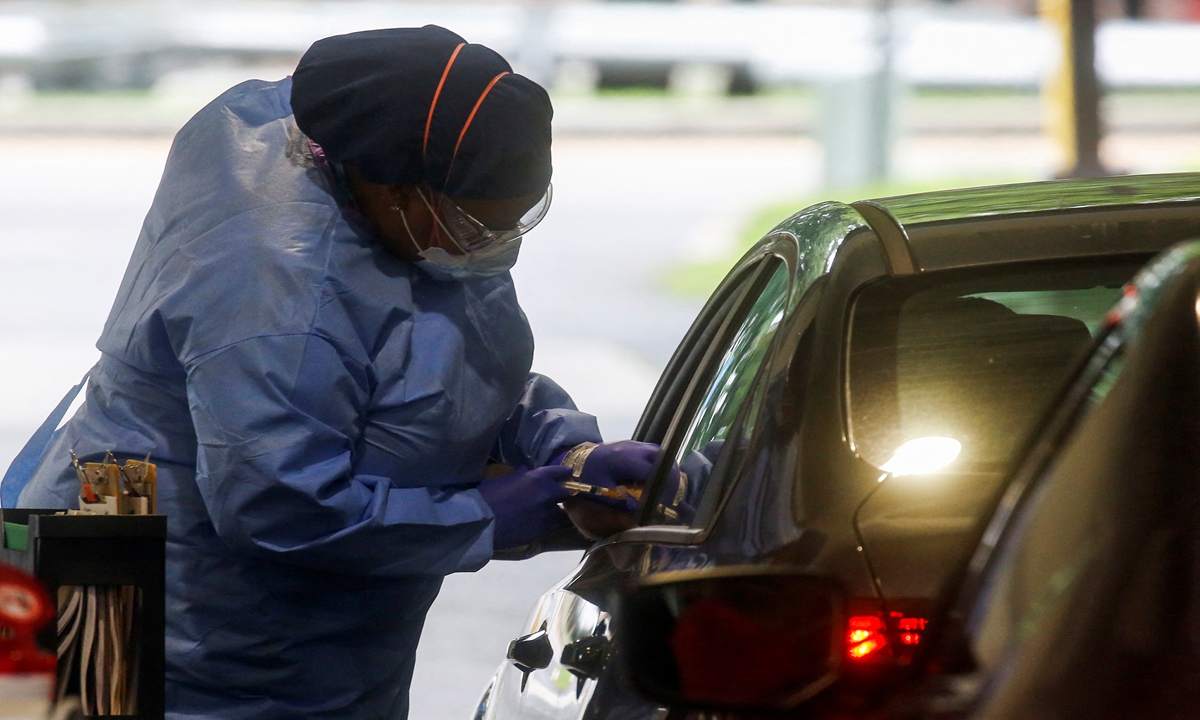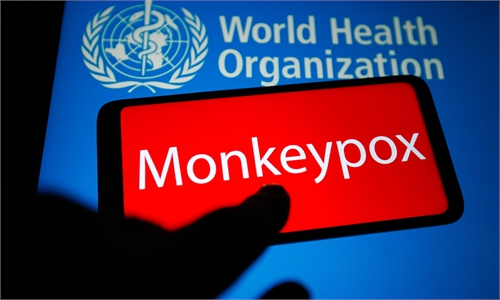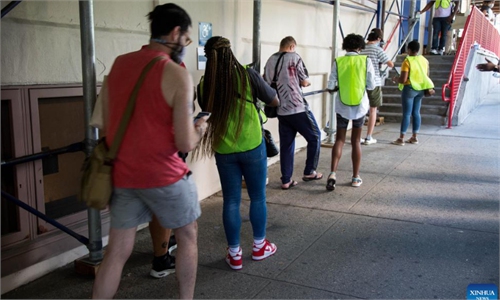
A staff member of the Westchester Medical Center applies a monkeypox vaccine to a person in a drive-through monkeypox vaccination point at the Westchester Medical Center in Valhalla, New York, U.S., July 28, 2022. Photo: IC
The monkeypox outbreak in the US, in some aspects, seems to be repeating the COVID-19 experience. Less than a week ago, Europe was the epicenter of the virus, but now, the US is witnessing the world's highest tally of monkeypox cases. An air of desperation is sensed among some US experts. "Monkeypox is about to become the next public health failure," reads a headline by Scott Gottlieb, former commissioner of the Food and Drug Administration, in The New York Times on Saturday.
"Our country's response to monkeypox has been plagued by the same shortcomings we had with COVID-19," Gottlieb wrote. He later explained that the virus was not detected in a timely manner. Yet even after the disease snowballed into an epidemic, the US, once again, failed to take it under control for "an absence of coordination among federal agencies," and US common reflex - blaming political leadership "for poor planning, lack of urgency and clumsy execution."
These all point to one direction - the dysfunctional political system. Because of such a system, whenever a crisis emerges, when American politicians are supposed to unite and confront their common enemy, they are only busy fighting each other. No one can mobilize the country's resources to reach an agreed goal. In the end, the US is not only incapable of solving the problems, but also exacerbating them.
One of the outcomes of systemic dysfunction is the US' addiction to find a scapegoat and to divert public attention. As of press time, the US has reported more than 91.3 million COVID-19 cases, almost 1.03 million deaths, as well as nearly 5,200 people diagnosed with monkeypox. Meanwhile, the US is discussing and planning to spend $52 billion in chip funding, a $45 billion increase in US defense budget, or a total of $858 billion in US entire military spending. The money should be better spent to serve Americans' health. Instead, they could all turn up being invested in containing US imaginary enemies in other parts of the world.
When the politicians find themselves incapable of confronting challenges, they selfishly choose to take the easy path, instead of doing the right thing, Shen Yi, a professor at Fudan University, told the Global Times. Over time, the US gradually fell into a state of insanity - all it is aware of is fighting against something, rather than fighting for something. It lost its real target.
In his article, Gottlieb noted that the monkeypox outbreak "was so avoidable." The US failed the test anyway, far from matching the country's resources, status and people's perception about it. Now, the US' own problems are coming back to haunt the country. Monkeypox could be only a start. Worse, the American people may not be the only victims.
The COVID-19 pandemic has highlighted the significance of global governance. It made clear that a global crisis cannot be resolved by any one country acting alone. Unfortunately, the US, the dominant player in global governance, invests heavily and constantly on weapons and wars, while simultaneously showing incompetence in saving people.
The US-led global governance mechanism, reinforced after the end of the Cold War, in which people are made to believe Western countries can always offer high-quality global public goods and governance model, no longer works. The reason has been unveiled from the COVID-19 epidemic to the monkeypox outbreak - the US' own incompetence and decline, Shen said.
When the US cannot cope with the challenges and even drags the world down, demands will rise to ask those with more capabilities, willingness and resources to take the lead in global governance, Shen noted.
A few days ago, a California man was reported to be infected with both COVID-19 and monkeypox at the same time. An American expert said "It's just incredibly bad luck." The California patient may be the first case but certainly not the last. Will the US ever learn the lesson? The answer will tell whether "incredibly bad luck" will become the portrayal of future American fate.


